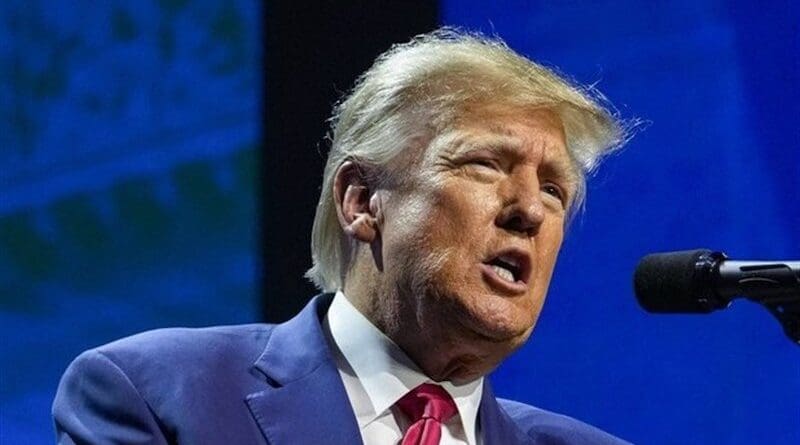Trump’s Campaign Persists Despite Legal Conviction – OpEd
By Arab News
By Dalia Al-Aqidi
Former US President Donald Trump has vehemently denounced his criminal trial in New York, describing it as “extremely unfair” after being convicted last week of falsifying accounting records to cover up a payment intended to silence an adult film actress. The high-profile trial culminated in 34 guilty verdicts related to a $130,000 payment to Stormy Daniels, with whom he allegedly had an affair before the 2016 presidential election.
In a fiery speech from the lobby of Trump Tower in Manhattan, Trump — who is once again the Republican candidate for the upcoming November election — did not hold back his contempt for the legal proceedings and the current administration. He accused Democratic President Joe Biden and his administration of being “sick” and “fascists,” framing the trial as a politically motivated attack designed to undermine his candidacy.
The former president passionately criticized the decision, labeling it “unfair” and the trial itself as “fake.” He asserted that the verdict resulted from a biased judicial process, emphasizing: “We will challenge this fraud.” Despite his strong words, Trump acknowledged that he would have to wait until the final ruling on July 11 before he can initiate an appeal. Addressing a crowd of supporters and media, Trump claimed that the case against him was part of a broader effort by his political adversaries to sabotage his campaign. As he portrayed himself as a victim of a corrupt system, he insisted that the charges were fabricated to prevent him from returning to the White House.
The sentence handed down will likely be suspended until the appeals process plays out, meaning Trump will not serve any time or face any penalties in the short term. This process could take months or even years, allowing Trump to continue his activities, including his presidential campaign, without immediate legal consequences.
Trump’s conviction marks a significant moment in his post-presidential life, as he continues to grapple with multiple legal challenges while also campaigning for a return to power. His defiant stance and allegations of political persecution are likely to further polarize an already-divided electorate, setting the stage for a contentious and high-stakes election season.
The GOP quickly rallied around its presidential candidate to send a unifying message to its base. Several high-ranking Republicans launched strong attacks against the justice system, arguing that the legal actions taken against Trump are politically motivated and intended to undermine his candidacy. They emphasized that these actions are part of a broader attempt by Democrats to influence the outcome of the 2024 election.
At the same time, these Republican leaders are underscoring the importance of the upcoming election, framing it as a pivotal moment for the party and the country. They argue that the election’s outcome will determine the nation’s future direction and the preservation of conservative values. In their statements, they defend Trump and call on their supporters to mobilize and participate actively in the electoral process.
Many of these leaders also seized the opportunity to make fundraising appeals, urging their supporters to contribute to their campaigns and the party. Financial support is crucial to counteract political attacks and ensure a robust campaign leading up to November. By doing so, they aim to galvanize their base, generate enthusiasm and secure the necessary resources to compete effectively against their Democratic opponents at every level.
Indeed, a significant influx of money began to flow toward the GOP presidential candidate following the verdict. According to Lara Trump, the Republican National Committee co-chair and the former president’s daughter-in-law, more than $70 million was raised from small-donor contributions in just three days. This substantial fundraising surge demonstrates the solid financial support and loyalty from the party’s grassroots base. The rapid accumulation of funds highlights the energized response from Trump’s supporters, who are rallying behind him despite his legal challenges.
The looming question is whether Trump will end up behind bars. The judge has set July 11 as the sentencing date, a moment when the world will discover the former American president’s future.
The minimum penalty for first-degree falsification of business records starts at zero, meaning Trump could be given probation or a conditional discharge, resulting in no jail time. Alternatively, he could be sentenced to up to four years for each offense. However, any prison time would likely be served concurrently, meaning the maximum duration would be four years in total.
Trump might also face the possibility of home detention as an alternative to jail time. This would require him to wear an ankle bracelet for electronic monitoring, allowing the authorities to keep track of his movements without confining him to a cell. Such a sentence would allow some freedoms that jail does not, enabling him to serve his time in the comfort of his own home.
Home detention would allow Trump to continue his political activities uninterrupted. He could campaign virtually from his residence, utilizing video conferencing technology to connect with supporters and hold press briefings. This arrangement would also permit him to remain highly active on social media, giving him a direct line of communication to his base. By staying engaged in the political discourse, Trump could sustain his influence and visibility, effectively running a campaign from home.
He could pursue a delay in serving any sentence by appealing the verdict, effectively postponing his time behind bars until an appeals court makes its ruling. This strategy could push back any incarceration until after the election or even further.
Despite the hurdles that a possible prison sentence might introduce to Trump’s presidential campaign, his conviction does not prevent him from running for office. Even if he were to be incarcerated, the legal judgment does not disqualify him from continuing his bid for the presidency. Thus, his political aspirations remain viable, irrespective of the legal challenges he encounters.
- Dalia Al-Aqidi is executive director at the American Center for Counter Extremism.

